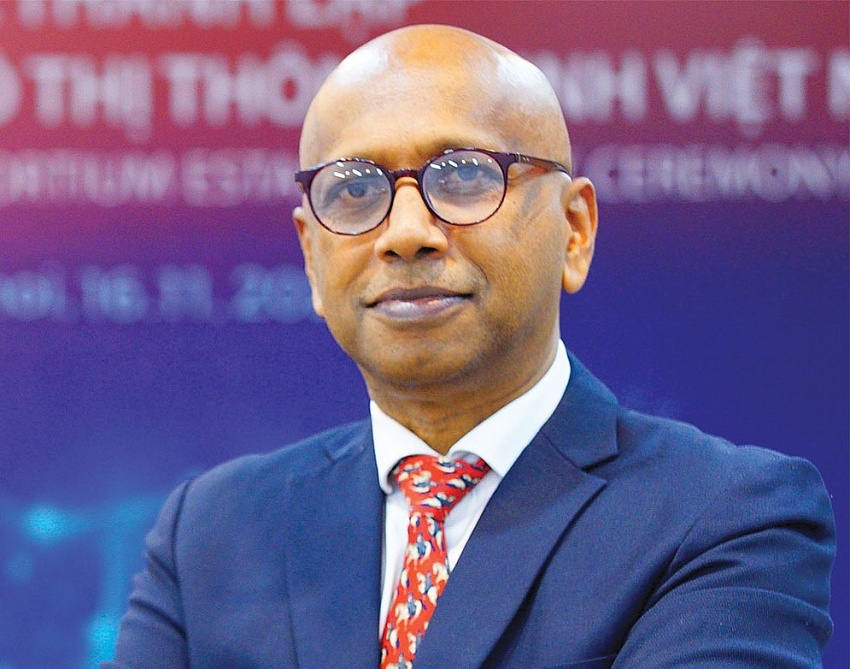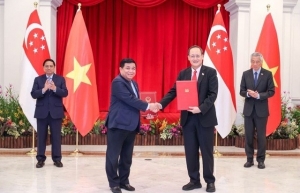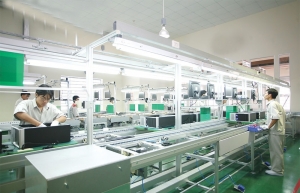Tremendous room for growth in investment ties
How has the Vietnam-Singapore Economic Connectivity Agreement helped strengthen the bilateral investment and trade ties?
 |
| Shanmuga Retnam, executive co-chairman of the Vietnam Smart Cities Consortium |
The Vietnamese and Singaporean governments have been working to strengthen cooperation in the key areas within the framework of the Vietnam-Singapore Economic Connectivity Agreement. They are investment, finance, ICT, education and training, transport, trade, and services.
Our economic relations between the two countries are strong and substantive. This is evidenced by trade and investment figures that have grown steadily over the past decade, riding on the stellar growth of Vietnam, and vast opportunities presented by a young and vibrant market.
In recent years, the Vietnamese government has been actively promoting economic development in the north of Vietnam, which has given rise to improved infrastructure, the establishment of new industrial zones, and a more pro-business and conducive environment.
One good example is the Vietnam-Singapore Industrial Park (VSIP). First established in 1996, the VSIP is a joint venture between Singapore’s Sembcorp Industries and Vietnam’s Becamex. Over the past 27 years, there have been 14 VSIPs across 10 provinces in Vietnam, attracting $18.4 billion worth of investment capital, and creating around 300,000 jobs. They have contributed substantially to Vietnam’s manufacturing and export sectors, created jobs and upskilled talent.
In terms of transportation, Singapore is one of the aviation markets of special importance to Vietnam. Currently, the two countries are each other’s sixth-largest market.
Cooperation in security and defence, finance and banking, education and training, natural resources and environment, and law and order between the two countries continues to be strengthened.
What are possible trends in Singaporean investment in Vietnam in 2023 and beyond, and what are the important factors for Vietnam to increase its attraction?
Vietnam’s strong domestic consumption, in addition to a young and skilled workforce, have also enhanced the country’s appeal and reputation as a regional export -led manufacturing hub.
IT outsourcing, manufacturing, agriculture, data centres, healthcare, private education, fintech, and hospitality are sectors that continue to provide attractive investment opportunities.
The Regional Comprehensive Economic Partnership, which entered into effect in 2022, positions Vietnam in a key place to take advantage of the 30 per cent of the total global GDP worth of $26.2 trillion. This has clearly raised Singapore’s interest to activate and accelerate the investment as we have seen in hospitals, restaurants, education, and industrial development in the past 12 months.
With a total digital economy value of $23 billion, Vietnam has a few more stages to match the Singapore digital powerhouse on a per-population basis. Vietnam’s population will be 20 times higher than Singapore by 2023, however the digital economy revenue of these two countries is strikingly similar, signalling a significant discrepancy and a major opportunity alike. Vietnam’s digital economy growth potential is set for exponential growth.
Vietnamese enterprises will need to better understand compliance and governance so they understand the practices for ease of integrating with their partners and clients in Singapore.
While Vietnam’s law and regulations are applied consistently to all provinces without distinction, the implementation procedures in practice may vary based on policy and interpretation. There is a need for consistency in law enforcement to create improvements for foreign investors, and Singaporean businesses in particular.
The Vietnam Business Exchange (VBEx) was designed to facilitate business matching between small- and medium-sized enterprises and startups between Vietnam and Singapore. We will host our first edition of VBEx Summit in Ho Chi Minh City in November, supported by industry partners from both countries to accelerate the identification of business opportunities in key sectors of technology, agriculture, industrial parts and smart city solutions.
What strategies and plans will the two countries focus on to enhance the bilateral trade and investment ties in the months to come?
The focus on city-to-city engagement has recently generated more tangible outcome, it enables business to access to projects directly with local governments. On August 1, the Singapore Manufacturing Federation hosted Ha Nam provincial leaders with the support of the Vietnamese Embassy to Singapore to present opportunities to potential investors.
In line with the ASEAN Connectivity Masterplan 2025, to achieve a seamlessly and comprehensively connected and integrated ASEAN, Vietnam’s population “demographic dividend” of a young IT literate workforce presents a distinct competitive advantage for Singapore. Around 70 per cent of Vietnamese citizens under 35 are educated and tech-savvy, which enables Singapore to develop more robust ‘hub and spoke’ economic strategies to leverage and leap frog on ICT for economic growth.
For instance, in the fintech industry, Singapore leads the region with 1,580 companies in 2022. However, the Singaporean market is becoming increasingly competitive and may be reaching a saturation point. Meanwhile, Vietnam’s fintech industry is accelerating, with tremendous room for growth within the next five years and even next decade one. As a result, this creates an opportunity for Singapore investors and product developers to expand their businesses into fintech and AI related sectors leveraging on Vietnam.
Currently, the two countries are expanding cooperation in the fields of innovation, digital transformation, digital economy, and green and sustainable development, expecting to bring Vietnam-Singapore economic connectivity to new heights.
 | Vietnam establishes task force to propel economic partnership with Singapore Prime Minister Pham Minh Chinh gave the green light to Decision No.912/QD-TTg on August 2, ushering in a comprehensive cross-agency task force with the key role of putting the MoU governing the Green and Digital Economic Partnership between Vietnam and Singapore into action. |
 | Sustaining mutual growth through new networks Vietnam and Singapore are intensifying their bilateral ties in new fields with focus set on innovation, energy, and sustainability. Jaya Ratnam, Singaporean Ambassador to Vietnam, provides analysis on how this cooperation has been implemented and benefited the two countries. |
 | Singaporeans exploring all avenues Singaporean investors are retaining interest in Vietnam in sectors from property, renewable energy and manufacturing to healthcare and technology. |
What the stars mean:
★ Poor ★ ★ Promising ★★★ Good ★★★★ Very good ★★★★★ Exceptional
Related Contents
Latest News
More News
- SK Innovation-led consortium wins $2.3 billion LNG project in Nghe An (February 25, 2026 | 07:56)
- THACO opens $70 million manufacturing complex in Danang (February 25, 2026 | 07:54)
- Phu Quoc International Airport expansion approved to meet rising demand (February 24, 2026 | 10:00)
- Bac Giang International Logistics Centre faces land clearance barrier (February 24, 2026 | 08:00)
- Bright prospects abound in European investment (February 19, 2026 | 20:27)
- Internal strengths attest to commitment to progress (February 19, 2026 | 20:13)
- Vietnam, New Zealand seek level-up in ties (February 19, 2026 | 18:06)
- Untapped potential in relations with Indonesia (February 19, 2026 | 17:56)
- German strengths match Vietnamese aspirations (February 19, 2026 | 17:40)
- Kim Long Motor and AOJ Suzhou enter strategic partnership (February 16, 2026 | 13:27)

 Tag:
Tag:




















 Mobile Version
Mobile Version